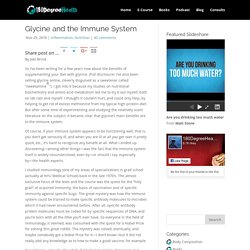

Food Lists for Glycine. Health Benefits of Glycine. 1.

Preface Glycine is an amino acid, and it is generally considered non-essential because we can usually synthesize some glycine from amino acids serine and threonine and from some other compounds as well. However, I have seen a compelling amount of evidence showing that body cannot necessarily produce enough glycine for optimal health, and therefore it might be beneficial to get generous amounts glycine from dietary sources. 2. Dietary requirements A French-Spanish research group, in their review article (2009), wrote that humans can usually synthesize 3 grams of glycine, and they usually get 1.5-3.0 additional grams from the diet, so the total yield is 4.5-6 grams. On the other hand, they stated that this amount doesn't satisfy the daily need of 10-13 grams for collagen synthesis in various tissues (bone, muscle, skin), and therefore glycine should be considered a semi-essential amino acid.[1] 3.
"Glycine is recognized as an “inhibitory” neurotransmitter, and promotes natural sleep. 4. 5. Glycine With a Meal for Blood Sugar. Why You Need Glycine: A Panel Discussion.
Valtsu's: Health Benefits of Glycine. Glycine and the Immune System - 180 Degree Health. By Joel Brind So I’ve been writing for a few years now about the benefits of supplementing your diet with glycine.

(Full disclosure: I’ve also been selling glycine online, cleverly disguised as a sweetener called “sweetamine®”). I got into it because my studies on nutritional biochemistry and amino acid metabolism led me to try it out myself, both on lab rats and myself. I thought it couldn’t hurt, and could only help, by helping to get rid of excess methionine from my typical high-protein diet. But after some time of experimenting and studying the relatively scant literature on the subject, it became clear that glycine’s main benefits are to the immune system. Of course, if your immune system appears to be functioning well, that is, you don’t get seriously ill, and when you are ill at all you get over it pretty quick, etc., it’s hard to recognize any benefit at all.
But I digress. Inflammation is a wonderful thing. So here are some common examples: Glycine and Insulin Resistance - 180 Degree Health. By Joel Brind For many of us, the downside of the holidays is the dread of adding a few pounds of abdominal fat that will take more than a New Year’s resolution to work off.

Even worse, we all also know that it’s the extra abdominal fat that causes insulin resistance and eventually—or maybe already—type 2 diabetes. But more recent research tells a more precise—and cheerful—story about what is really going on. It’s not the actual fat (adipose) tissue that causes the problem after all: It’s the immune cells—the macrophages, to be specific—that are embedded in the adipose tissue, that stir up the trouble.
So why do the macrophages get stirred up, and what do they do that’s so damaging as to ultimately cause diabetes and all the morbidity and mortality that follows? A little more background is in order here: Insulin is the hormone secreted by the beta cells of the pancreas in response to and/or the anticipation of the rise in blood glucose (blood sugar) that happens after a carb-rich meal. The Link Between Nutrient Dense Foods and Collagen. Collagen is a building block of the body, providing support for the growth and repair of skin, teeth, bones, ligaments and tendons.

Given its vital role in maintaining health and vibrancy, it is no wonder that people want more of it. Now being pumped into creams, pills, powders and even injections, claims about the nutricosmetic superstar collagen have been splashed into magazines and highlighted in store displays. Yet, taking a step back from this glamorous buzz, it is important to consider collagen from a holistic perspective: how does it work in the body and where does it come from? Learn why traditional diets naturally provided support for the production of collagen, and how you can reincorporate these wholesome sources into your diet to help your body stay youthful and strong. What is Collagen? Collagen is an insoluble fibrous protein that is found in many of the supportive structures in our body.
So where does collagen come from? Gathering the Building Blocks. Glycine: The Amino Acid that Benefits Your Entire Body. While you may not be familiar with the term specifically, you use glycine every day to strengthen your body and, frankly, allow it to work properly.

This amino acid is essential for many different muscle, cognitive and metabolic functions. It helps break down and transport nutrients like glycogen and fat to be used by cells for energy, and in the process, it supports strong immune, digestive and nervous systems. In the human body, glycine is found in high concentrations in the skin, connective tissues of the joints and muscle tissue. One of the key amino acids used to form collagen and gelatin, glycine can be found in bone broth and other protein sources. In fact, glycine (along with many other nutrients like proline and arginine) is part of what gives “superfood” bone broth its amazing healing abilities. Click here for a free guide explaining the 6 benefits of glycine! Almost there! Enter your email to download this free guide right now. 1. 2. 3. 4.